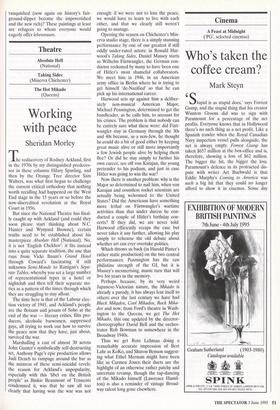Theatre
Absolute Hell (National) Taking Sides (Minerva Chichester) The Hot Mikado (Queens)
Working with peace
Sheridan Morley
Te rediscovery of Rodney Ackland, first in the 1970s by my distinguished predeces- sor in these columns Hilary Spurling, and then by the Orange Tree director Sam Walters, was what first began to challenge the current critical orthodoxy that nothing worth recalling had happened on the West End stage in the 15 years or so before the now-discredited revolution at the Royal Court in 1956.
But since the National Theatre has final- ly caught up with Ackland (and could they soon please start thinking about N.C. Hunter and Wynyard Browne), certain truths need to be established about his masterpiece Absolute Hell (National). No, it is not 'English Chekhov': it fits instead into a quite separate tradition, the one that runs from Vicki Baum's Grand Hotel through Coward's fascinating if still unknown Semi-Monde to Rattigan's Sepa- rate Tables, whereby you set a large number of representational types in a hotel or nightclub and then tell their separate sto- ries as a pattern of the times through which they are struggling to stay afloat.
The time here is that of the Labour elec- tion victory of 1945, and Ackland's people are the flotsam and jetsam of Soho at the end of the war — literary critics, film pro- ducers, alcoholic barwomen, suppressed gays, all trying to work out how to survive the peace now that they have, just about, survived the war.
Marshalling a cast of almost 30 across John Gunter's symbolically self-destructing set, Anthony Page's epic production allows Judi Dench to rampage around the bar as the mistress of these semi-suicidal revels: the reason for Ackland's unpopularity, especially with this 'libel on the British people' as Binkie Beaumont of Tennents condemned it, was that he saw all too clearly that having won the war was not enough: if we were not to lose the peace, we would have to learn to live with each other, and that we clearly still weren't going to manage.
Opening the season on Chichester's Min- erva studio stage, there is a simply stunning performance by one of our greatest if still oddly under-rated actors: in Ronald Har- wood's Taking Sides, Daniel Massey starts as Wilhelm Fiirtvvangler, the German con- ductor reckoned by many to have been one of Hitler's most shameful collaborators. We meet him in 1946, in an American army office in Berlin where he is trying to get himself 'de-Nazified' so that he can pick up his international career.
Harwood sets up against him a deliber- ately non-musical American Major, Michael Pennington, determined to get the bandleader, as he calls him, to account for his crimes. The problem is that nobody can be entirely sure what these were: did Fiirt- wangler stay in Germany through the 30s and 40s because, as a non-Jew, he thought he .could do a bit of good either by keeping great music alive or still more importantly a few Jewish people alive by helping them flee? Or did he stay simply to further his own career, see off von Karajan, the young pretender to his podium, and just in case Hitler was going to win the war?
Now there is another problem: why is the Major so determined to nail him, when von Karajan and countless rocket scientists are actually being welcomed to the United States? Did the Americans have something more lethal on Fiirtwangler's wartime activities than that under duress he con- ducted a couple of Hitler's birthday con- certs? If they did, we are never told: Harwood efficiently recaps the case but never takes it any further, allowing his play simply to rehearse the old debate about whether art can ever overtake politics.
Which throws us back (in Harold Pinter's rather static production) on the two central performances: Pennington has the raw philistine strength of the GI, but it is Massey's mesmerising, manic turn that will live for years in the memory.
Perhaps because, by its very weird Japanese-Victorian nature, the Mikado is already a parody, it has always lent itself to others: over the last century we have had Black Mikados, Cool Mikados, Rock Mika- dos and now, from Ford's theatre in Wash- ington to the Queens, we get The Hot Mikado, this one updated by the director- choreographer David Bell and the orches- trator Rob Bowman to somewhere in the Broadway 1940s.
Thus we get Ross Lehman doing a remarkably accurate impression of Bert Lahr as KoKo, and Sharon Benson suggest- ing what Ethel Mermen might have been like, as Carmen Jones: their duets are the highlight of an otherwise rather patchy and uncertain revamp, though the tap-dancing of the Mikado himself (Lawrence Hamil- ton) is also a reminder of vintage Broad- way talent long gone elsewhere.


































































 Previous page
Previous page